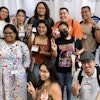NEW YORK – When the Barnard Center for Research on Women (BCRW) was founded in 1971 it was the first of its kind in the United States—a central location that joined together scholarly inquiry in the then emerging field of women’s studies with political activism in the feminist movement. BCRW’s mission in the words of the original charter is to ensure that women “can live and work in dignity, autonomy and equality.”
Notable occurrences in the life of BCRW include the first annual Scholar & Feminist Conference in 1974; the infamous “sex conference” in 1982, out of which came the publication of Pleasure and Danger: Exploring Female Sexuality; the 2003 founding of the online journal S&F Online, which disseminates the work of BCRW; and the founding of the print publication New Feminist Solutions in 2004, which addresses concrete policy initiatives that grow out of the intellectual work of BCRW and its collaboration with activist organizations.
Over the past four decades, the field of women’s and gender studies has evolved greatly as have the issues addressed by political activists. The ongoing collaboration was marked by “Activism and the Academy: Celebrating 40 Years of Feminist Scholarship and Action.”
This past Friday and Saturday panelists and speakers addressed topics related to how feminist inquiry is crucial to advancing issues of social justice.
“Intellectual work that happens in the context of colleges and universities can be leveraged for more practical and policy oriented activist projects,” noted Dr. Elizabeth A. Castelli, acting director of BCRW.
Dr. Sonia E. Alvarez, Leonard J. Horwitz professor of Latin American Politics and Studies and director of the Center for Latin American, Caribbean and Latino Studies at UMass Amherst, gave the keynote address on day one. Her presentation focused on an overview of the forthcoming book Translocalities/Translocalidades: Feminist Politics of Translation in the Latin/a Americas, of which she is one of the editors.
The book is a collaborative project with 23 chapters written by 24 contributors. It involves building a framework and a bridge across a number of divides.
“It crosses disciplinary boundaries as shamelessly and energetically as geopolitical ones,” said Alvarez. The authors come from diverse geographic locales and areas of expertise, including media studies, literature and science.
Translocality involves putting local issues in a global context and making it widely accessible. What many of the contributors touch upon in the book is that they often find themselves translating or explaining perspectives or ideologies from one entity, person or group of people to another.
Alvarez described the book as a “sustained dialogue, a rarity for anthologies,” she said. “The essays in the book are in explicit conversation with one another. That conversation is intergenerational as well as interethnic, international and interdisciplinary. It has required all of us to interrogate some of our most worthy and steadfastly held assumptions and inspired many of us to learn to read and to translate in new ways.”
Alvarez said many of the contributors dubbed themselves “translocas,” which are “more than world traveling translators. We are cultural, political, theoretical mediators.”
The major goal of the anthology is to destabilize the North/South dichotomy and highlight how translocal feminist subjects and theories are constituted in space and deed. Hopefully, it will foster greater understanding and improve dialogues and alliances among academics and activists in ways that are inclusive socially, sexually, racially, economically, environmentally just and feminist.
At Friday’s plenary panel four women from the world of activism described how the academy is vital to their work.
Ai-jen Poo, director of the National Domestic Workers Alliance, which is made up of 35 local organizations of nannies, housekeepers and caregivers for the elderly, spoke about how the work of academics has helped transform laws and policies as well as ways of thinking about domestic workers. She presented NDWA’s new national campaign, Caring Across Generations, which addresses the aging crisis in America and how it impacts caregivers, many of whom are women of color.
“If you put a gender lens on the world, not only do you see the world more clearly, but you also see the realm of possibilities for strategy more clearly and more fully,” Poo said.
Sydnie L. Mosley, a 2007 Barnard graduate with a double major in dance and Africana studies, is now BCRW’s inaugural alumnae fellow.
“This fellowship is an opportunity that I sought out to ground my work as an independent dance artist with many interests. This includes the intersections of modern dance, movement and the African diaspora, words and feminism,” Mosley said.
Mosley is a Harlem-based artist, presenting her work in various performance spaces in the Harlem community. Mosley has developed a project that involves activism and scholarship titled The Window Sex Project, which addresses issues of sexual harassment that women encounter daily on the streets.
Mosley recently held several creative movement workshops, including one on the Barnard campus, where women voiced their concerns about street harassment through words and movement. Mosley is currently creating a full-length dance work integrating this movement and stories from the Harlem community. Her goal for this year of her fellowship is to create a curriculum for responding to harassment out of The Window Sex Project that can be implemented in communities.
“I developed a process equally dependent on theory and practices,” she said. “Academia provides the foundation for feminist activism.”
Ana Oliveira, president and CEO of the New York Women’s Foundation, said academics “permit a production of knowledge.”
“It’s really important for us to be more efficient in effecting the change that we want to affect,” Oliveira said. “The academy brings access to the realm of ideas and the realm of policy.”
“The Barnard Center for Research on Women and its partnerships are one of the few places that allow the possibility to reflect and to ask new questions,” said Amber Hollibaugh, interim director of Queers for Economic Justice. “Going forward in innovative ways,” she explains.















